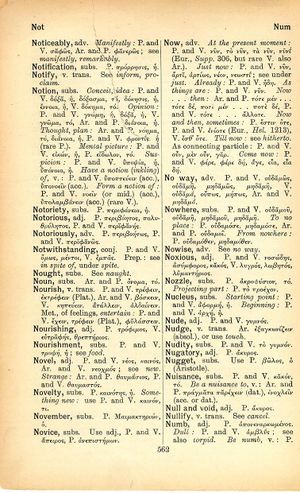nucleus
κρέσσων γὰρ οἰκτιρμοῦ φθόνος → it is better to be envied than pitied | to be envied is a nobler fate than to be pitied (Pindar, Pythian 1.85)
English > Greek (Woodhouse)
subs.
Starting point: P. and V. ἀφορμή, ἡ. Beginning: P. and V. ἀρχή, ἡ.
Latin > English (Lewis & Short)
nū̆clĕus: (nŭcŭlĕus), i, m. for nuculeus, from nux,
I a little nut.
I Lit.
A A nut; applied also to fruits resembling a nut: nucleus amygdalae, Plin. 15, 13, 12, § 42: avellanae, id. 37, 4, 15, § 56: pinearum nucum, id. 15, 10, 9, § 35; cf. pineus, Cels. 2, 22.—Prov.: e nuce nuculeum qui esse vult, frangit nucem, he who would eat the kernel of a nut breaks the nut, i. e. he who desires an advantage should not shun the labor of earning it, Plaut. Curc. 1, 1, 55: nuculeum amisi, retinui pigneri putamina, I have lost the kernel and kept the shell, id. Capt. 3, 4, 122.—
B The hard, uneatable kernel, the stone of fruits: nuculei olivarum, Plin. 37, 11, 73, § 188: persicorum, id. 23, 7, 67, § 132: cerasorum, id. 23, 7, 72, § 141: lignosus nucleus, id. 13, 19, 34, § 112: acini, id. 23, 1, 9, § 13.—
II Transf.
A The kernel, the inner part, inside of a thing: nucleus gallae, Plin. 24, 4, 5, § 10: myrrhae, id. 12, 16, 35, § 70: allii, id. 19, 6, 34, § 111: conchae, pearls, id. 9, 35, 55, § 111.—
B The kernel, i. e. the hardest, firmest, most solid part of a thing: pinguitudinis (terrae), Plin. 17, 6, 4, § 42: ferri, id. 34, 14, 41, § 144; 36, 25, 62, § 187: insuper ex testā nucleus inducatur, Vitr. 7, 1.
Latin > French (Gaffiot 2016)
nŭclĕus,¹³ ī, m. (nux),
1 amande de la noix et de fruits à coquille : [prov.] qui e nuce nucleum esse volt, nucem frangit Pl. Curc. 55, celui qui veut manger l’amande de la noix, casse la noix || [fig.] nucleum amisi Pl. Capt. 655, j’ai laissé échapper l’amande, le meilleur
2 noyau, pépin : Plin. 37, 188 || partie intérieure d’une chose : Plin. 24, 10 ; 12, 70 ; conchæ Plin. 9, 111, perle || [fig.] la partie la plus dure d’un corps : Plin. 17, 42 ; 34, 144 ; Vitr. Arch. 7, 1. d. Pl. Curc. 55 les mss donnent nuculeum ou nucleum ; d. Capt. 655 nuculeum Non., nucleum Don.
Latin > German (Georges)
nucleus (u. gedehnt nuculeus, Plaut. capt. 655 u. Curc. 55), eī, m. (v. nux), der Kern, I) eig.: a) der eßbare Kern der Nuß und ähnlicher Früchte, pinei, Cels.: pinearum nucum, Plin.: amygdalae, Plin.: allii, Knoblauchszehe, Plin. – dah. sprichw., nuculeum amisi, retinui pignori putamina, Plaut. capt. 655: e nuce nuculeum qui esse (essen) vult, frangit nucem, wer den Vorteil will, scheue die Anstrengung nicht, Plaut. Curc. 55. – b) der nicht eßbare Kern der Obstfrüchte, mali Persici, Cels.: cerasi, Plin.: acinorum, Plin. – II) übtr., der Kern, d.i. a) das Inwendige, gallae, murrae, Plin. – b) das Härteste einer Sache, ferri, Stahl, Plin.: der Erde, Plin.

